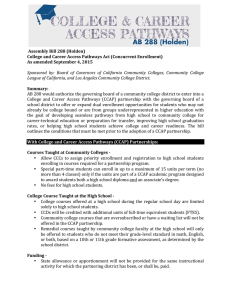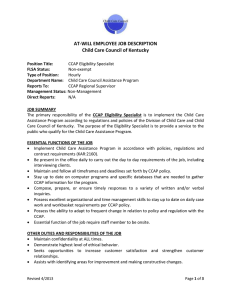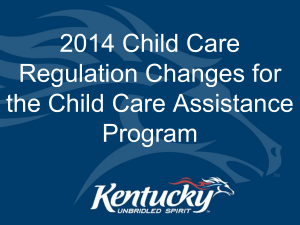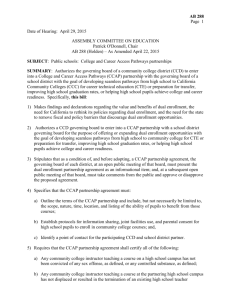AB 288 (Dual Enrollment) College and Career Access Pathways (CCAP)
advertisement
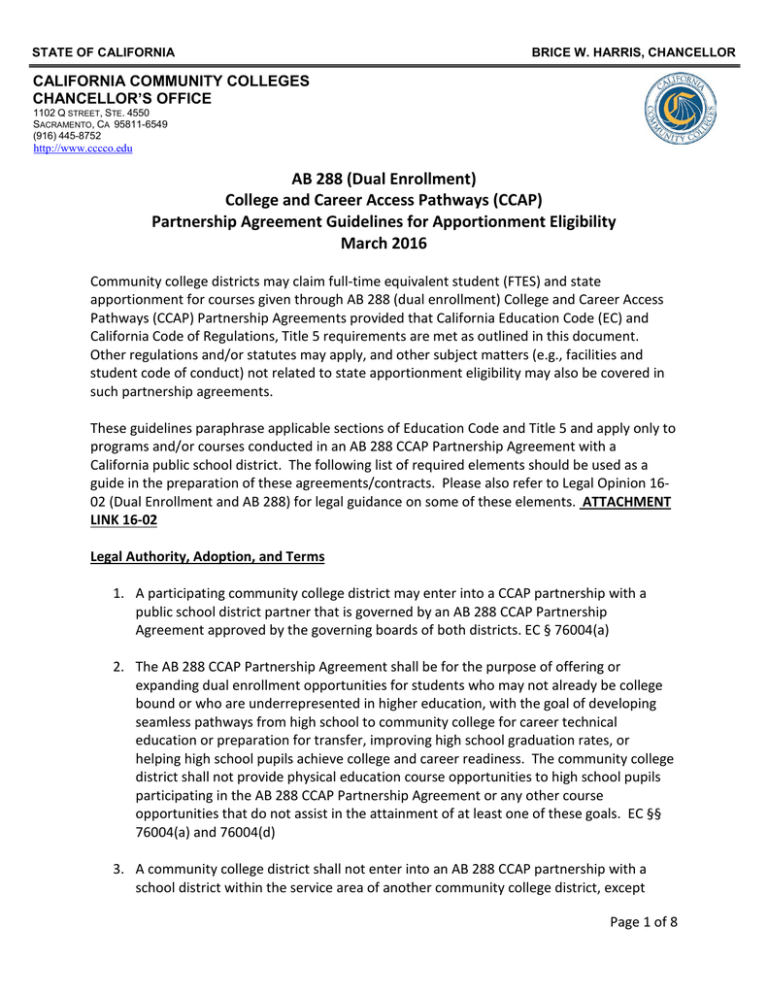
STATE OF CALIFORNIA BRICE W. HARRIS, CHANCELLOR CALIFORNIA COMMUNITY COLLEGES CHANCELLOR’S OFFICE 1102 Q STREET, STE. 4550 SACRAMENTO, CA 95811-6549 (916) 445-8752 http://www.cccco.edu AB 288 (Dual Enrollment) College and Career Access Pathways (CCAP) Partnership Agreement Guidelines for Apportionment Eligibility March 2016 Community college districts may claim full-time equivalent student (FTES) and state apportionment for courses given through AB 288 (dual enrollment) College and Career Access Pathways (CCAP) Partnership Agreements provided that California Education Code (EC) and California Code of Regulations, Title 5 requirements are met as outlined in this document. Other regulations and/or statutes may apply, and other subject matters (e.g., facilities and student code of conduct) not related to state apportionment eligibility may also be covered in such partnership agreements. These guidelines paraphrase applicable sections of Education Code and Title 5 and apply only to programs and/or courses conducted in an AB 288 CCAP Partnership Agreement with a California public school district. The following list of required elements should be used as a guide in the preparation of these agreements/contracts. Please also refer to Legal Opinion 1602 (Dual Enrollment and AB 288) for legal guidance on some of these elements. ATTACHMENT LINK 16-02 Legal Authority, Adoption, and Terms 1. A participating community college district may enter into a CCAP partnership with a public school district partner that is governed by an AB 288 CCAP Partnership Agreement approved by the governing boards of both districts. EC § 76004(a) 2. The AB 288 CCAP Partnership Agreement shall be for the purpose of offering or expanding dual enrollment opportunities for students who may not already be college bound or who are underrepresented in higher education, with the goal of developing seamless pathways from high school to community college for career technical education or preparation for transfer, improving high school graduation rates, or helping high school pupils achieve college and career readiness. The community college district shall not provide physical education course opportunities to high school pupils participating in the AB 288 CCAP Partnership Agreement or any other course opportunities that do not assist in the attainment of at least one of these goals. EC §§ 76004(a) and 76004(d) 3. A community college district shall not enter into an AB 288 CCAP partnership with a school district within the service area of another community college district, except Page 1 of 8 March 2016 AB 288 – Dual Enrollment where an agreement exists, or is established, between those community college districts authorizing that AB 288 CCAP partnership. EC §§ 76004(e) and 78032 4. Before adopting the AB 288 CCAP Partnership Agreement, the governing board of each district, at an open public meeting of that board, shall present the dual enrollment partnership agreement as an informational item. EC § 76004(b) 5. The governing board of each district, at a subsequent open public meeting of that board, shall take comments from the public and approve or disapprove the proposed AB 288 CCAP Partnership Agreement. A copy of the approved AB 288 CCAP Partnership Agreement shall be filed with the Chancellor’s Office of the California Community Colleges. The Chancellor of the California Community Colleges may void any AB 288 CCAP Partnership Agreement it determines has not complied with the intent of the requirements of EC § 76004. (Note: Districts are advised to entitle the agreement/contract as “College and Career Access Pathways Partnership Agreement” to ensure that the district is triggering the legal rights under AB 288.) EC § 76004(b); 76004(c)(3) 6. The AB 288 CCAP Partnership Agreement shall outline the terms of the CCAP partnership and shall include, but not necessarily be limited to: a. The total number of high school students to be served. EC § 76004(c)(1) b. The total number of Full-Time Equivalent Student (FTES) projected to be claimed by the community college district. EC § 76004(c)(1) c. The scope, nature, time, location and listing of community college courses to be offered. EC § 76004(c)(1) d. The criteria to assess the ability of pupils to benefit from courses offered pursuant to an AB 288 CCAP Partnership Agreement. EC § 76004(c)(1) e. The protocols for information sharing, in compliance with all applicable state and federal privacy laws, joint facilities use, and parental consent for high school pupils to enroll in community college courses. EC § 76004(c)(1) f. The point of contact for the participating community college district and school district partner. EC § 76004(c)(2) g. Specification of which participating district will be the employer of record for purposes of assignment monitoring and reporting to the county office of education. This specification does not abrogate the “employee of the [community college] district” provisions under Cal. Code Regs., tit. 5, §§ Page 2 of 8 March 2016 AB 288 – Dual Enrollment 58050(a)(6), 58051(a)(1) and 58058 and as discussed under item 14 below. EC § 76004(m)(1) h. Specification of which participating district will assume reporting responsibilities pursuant to applicable federal teacher quality mandates. EC § 76004(m)(2) Required AB 288 CCAP Partnership Agreement Certifications 7. The AB 288 CCAP Partnership Agreement shall include the following certifications: a. That any community college instructor teaching a course on a high school campus has not been convicted of any sex offense as defined in ECS 87010, or any controlled substance offense as defined in ECS 87011. EC § 76004(h) b. That any community college instructor teaching a course at the partnering high school campus has not displaced or resulted in the termination of an existing high school teacher teaching the same course on that high school campus. EC § 76004(i) c. That a qualified high school teacher teaching a course offered for college credit at a high school campus has not displaced or resulted in the termination of an existing community college faculty member teaching the same course at the partnering community college campus. EC § 76004(j) d. That a community college course offered for college credit at the partnering high school campus does not reduce access to the same course offered at the partnering community college campus. EC § 76004(k)(1) e. That a community college course that is oversubscribed or has a waiting list shall not be offered in the AB 288 CCAP Partnership Agreement. EC § 76004(k)(2) f. That participation in the AB 288 CCAP Partnership Agreement is consistent with the core mission of the community colleges pursuant to ECS 66010.4, and that pupils participating in the AB 288 CCAP Partnership Agreement will not lead to enrollment displacement of otherwise eligible adults in the community college. EC § 76004(k)(3 ) g. That any remedial course taught by community college faculty (which includes a qualified high school teacher teaching a college course as an “employee” of the community college district pursuant to CCR, Title 5 Section 58058(b)) at a partnering high school campus shall be offered only to high school students who do not meet their grade level standard in math, English, or both based on an interim assessment in grade 10 or 11, as determined by the partnering school Page 3 of 8 March 2016 AB 288 – Dual Enrollment district, and that the delivery of these remedial courses shall involve a collaborative effort between high school and community college faculty to deliver an innovative remediation course as an intervention in the student’s junior or senior year to ensure the student is prepared for college-level work upon high school graduation. EC § 76004(n) h. That both the school district and the community college district partners comply with local collective bargaining agreements and all state and federal reporting requirements regarding the qualifications of the teacher or faculty member teaching an AB 288 CCAP Partnership Agreement course offered for high school credit. EC § 76004(l) Permissive AB 288 CCAP Partnership Agreement Activities and Practices 8. As applicable, the AB 288 CCAP Partnership Agreement shall make reference to the following permissive activities and/or practices if put into effect by the agreement: a. A community college district participating in a CCAP partnership may assign priority for enrollment and course registration to a pupil seeking to enroll in a community college course that is required for the pupil’s CCAP partnership program that is equivalent to the priority assigned to a pupil attending a middle college high school as described in ECS 11300 and consistent with middle college high school provisions in EC § 76001(e). b. A community college district may limit enrollment in a community college course solely to eligible high school students if the course is offered at a high school campus during the regular school day and the community college course is offered pursuant to the AB 288 CCAP Partnership Agreement. EC § 76004(o) c. A community college district may allow a special part-time student participating in the AB 288 CCAP Partnership Agreement to enroll in up to a maximum of 15 units per term if all of the following circumstances are satisfied (EC § 76004(p)): i. The units constitute no more than four community college courses per term. ii. The units are part of an academic program that is part of a CCAP partnership agreement. iii. The units are part of an academic program that is designed to award students both a high school diploma and an associate degree or a certificate or credential. Page 4 of 8 March 2016 AB 288 – Dual Enrollment Student Fees 9. The AB 288 CCAP Partnership Agreement shall make reference to the following student fee prohibitions and exemptions: a. High school pupils enrolled in courses offered through a CCAP agreement shall not be assessed or charged a fee prohibited by EC § 49011, including a fee charged to a pupil, or a pupil’s parent or guardian, as a condition for course registration or for textbooks, supplies, materials, and equipment needed to participate in the course. EC §§ 49010 et seq.; 76004(f) b. High school pupils enrolled in courses offered through the AB 288 CCAP Partnership Agreement and that are properly classified as having “special parttime student” status as described by EC § 76004(p) and item 8.c. above, shall be exempt from the following community college fee requirements [ECS 76004(q)]: i. ii. iii. iv. v. vi. Student Representation Fee. EC § 76060.5 Nonresident Tuition Fee. EC § 76140 Transcript Fees. EC § 76223 Course Enrollment Fees. EC § 76300 Apprenticeship Course Fees. EC § 76350 Child Development Center Fees. EC § 79121 State Apportionment 10. The AB 288 CCAP Partnership Agreement shall make reference to the following state apportionment eligibility provisions: a. A district shall not receive a state allowance or apportionment for an instructional activity for which the partnering district has been, or shall be, paid an allowance or apportionment. EC § 76004(r) b. The attendance of a high school pupil at a community college as a special parttime or full-time student pursuant to a CCAP agreement is authorized attendance for which the community college district shall be credited or reimbursed pursuant to ECS 48802 or 76002, provided that no school district has received reimbursement for the same instructional activity. EC § 76004(s) Page 5 of 8 March 2016 AB 288 – Dual Enrollment Reporting to the State Chancellor’s Office 11. The AB 288 CCAP Partnership Agreement shall make reference to the following reporting requirement as prescribed by EC § 76004(t): a. For each AB 288 CCAP Partnership Agreement entered into, the community college district, in conjunction with the partnering school district, shall report annually to the State Chancellor’s Office all of the following information: i. ii. iii. iv. The total number of high school pupils by school site enrolled in each CCAP partnership, aggregated by gender and ethnicity, and reported in compliance with all applicable state and federal privacy laws. The total number of community college courses by course category and type and by school site enrolled in by CCAP partnership participants. The total number and percentage of successful course completions, by course category and type and by school site, of CCAP partnership participants. The total number of Full-Time Equivalent Student (FTES) generated by CCAP partnership participants. Other AB 288 CCAP Partnership Agreement Requirements 12. The governing board of a community college district, prior to establishing a vocational or occupational training program (career technical education programs), shall conduct a job market study of the labor market area, and determine whether or not the results justify the proposed vocational education program. EC § 78015 et seq. 13. The AB 288 CCAP Partnership Agreement must state: a. the responsibilities of each party, including a notation that if operated on-site by the school district, the college or community college district is responsible for the educational program(s) and/or course(s), b. the procedures, terms and conditions relating to: i. enrollment period, ii. student fees, including as noted above under item 9, iii. the number of class hours sufficient to meet the stated performance objectives (if applicable), iv. supervision and evaluation of students, v. withdrawal of students prior to completion of a course or program, and Page 6 of 8 March 2016 AB 288 – Dual Enrollment c. the terms and conditions relating to cancellation and termination of the AB 288 CCAP Agreement. 14. The college or community college district has documentation that instruction claimed for apportionment under the agreement/contract is under the immediate supervision and control of an employee of the district who has met the minimum qualifications for instruction in the discipline of the course in a California community college. Instructors need to provide the supervision and control necessary for the protection of the health and safety of students and may not have any other assigned duty during the instructional activity. As a general rule, faculty must be physically present in the classroom or lab or within line-of-sight of the students. Cal. Code Regs., tit. 5, §§ 58050, 58051, 58056, 58058 a. Where the instructor is not a paid employee of the community college district, the college or community college district has an additional written agreement/contract with each instructor requiring student attendance and FTES to be reported by the instructor as required by the college or community college district and stating that the college or community college district has the primary right to control and direct the instructional activities of the instructor. Cal. Code Regs., tit. 5, § 58058(b) b. The college or community college district must demonstrate control and direction through such actions as providing the instructor an orientation, instructor’s manual, course outlines, curriculum materials, testing and grading procedures, and any other materials and services it would provide to its hourly on-campus instructors. 15. The college or community college district lists minimum qualifications for instructors teaching agreement/ contract courses and instructor qualifications are consistent with requirements in other similar courses given by the college or community college district. Cal. Code Regs., tit. 5, § 53410 16. Unless as provided under EC § 76004(o) and 8.b. above, the course(s) included in the agreement must be held at facilities which are clearly identified as being open to the general public, noting that students may be required to meet course or program prerequisites. Cal. Code Regs., tit. 5, § 58051.5 a. Unless as provided under EC § 76004(o) and 8.b. above, enrollment in the course must be open to any person who has been admitted to the college and has met any applicable prerequisites. Cal. Code Regs., tit. 5, §§ 51006, 58106 Page 7 of 8 March 2016 AB 288 – Dual Enrollment b. The district policy on open enrollment (Cal. Code Regs., tit. 5, § 55005) along with a description of the course and information about whether the course is offered for credit and is transferable must be published in the college catalogue, schedule of classes, and any addenda to the schedule of classes. Cal. Code Regs., tit. 5, § 51006 c. Degree and certificate programs must have been approved by the California Community Colleges Chancellor’s Office and courses that make up the programs must be part of the approved programs, or the college must have received delegated authority to separately approve those courses locally. Cal. Code Regs., tit. 5, § 58050(a)(1) 17. Procedures are put into place by the college to ensure that faculty teaching different sections of the same course teach in a manner consistent with the approved outline of record for that course. Cal. Code Regs., tit. 5, § 55002, 58050(a)(5) 18. Permanent records of student attendance, grades and achievement will be maintained by the school district or college (as determined appropriate by the community college district). Records will be open for review at all times by college officials and submitted on a schedule developed by the community college district. Cal. Code Regs., tit. 5, § 55021; 55040; 58030 19. It is agreed that both the school district and community college district will insure that ancillary and support services are provided for students (e.g. Counseling and Guidance, Placement Assistance, Assessment, and Tutoring). 20. The community college district must certify that it does not receive full compensation for the direct education costs of the course(s) from any public or private agency, individual, or group. EC § 84752; Cal. Code Regs., tit. 5, § 58051.5 21. The community college district is responsible for obtaining certification from the school district verifying that the instructional activity to be conducted will not be fully funded by other sources. EC § 84752; Cal. Code Regs., tit. 5, § 58051.5 22. If the course(s) will be located outside the boundaries of the district, the district must comply with the requirements of Title 5, sections 55300 et seq., concerning approval by adjoining high school or community college districts and use of non-district facilities. 23. In all cases, standard FTES computation rules, support documentation, course section tabulations, and record retention requirements continue to apply, including as prescribed by Cal. Code Regs., tit. 5, §§ 58003.1 et seq. , 58020 et seq., 58030 and 59020 et seq.. Page 8 of 8
